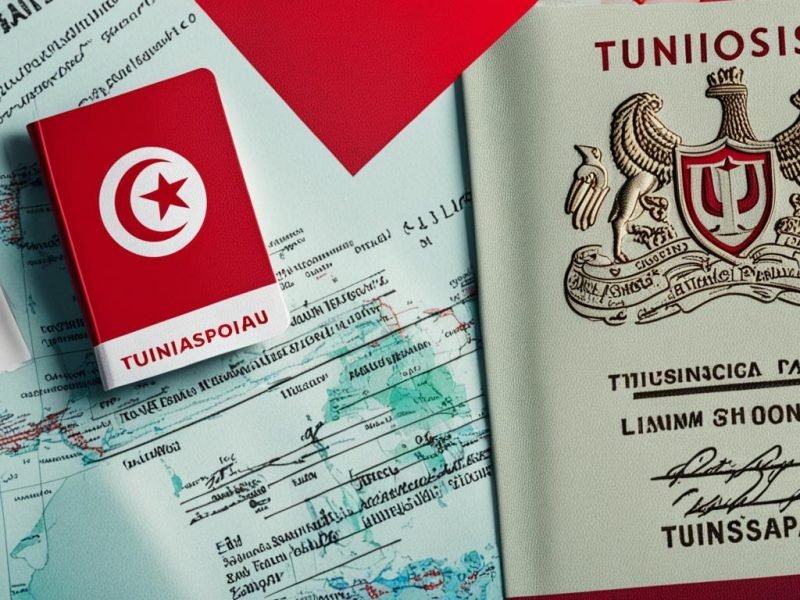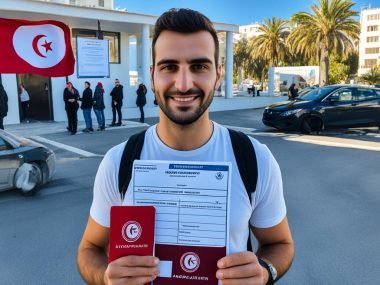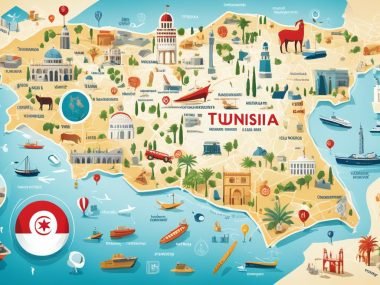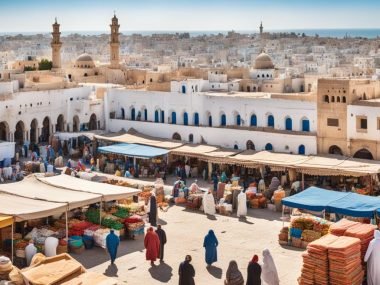Can you have dual citizenship with Tunisia? The Tunisian Nationality Code gives us the answer. This code explains how you can get or lose Tunisian nationality. It shows the difference between being legally tied to Tunisia and being its citizen.
Tunisia mainly uses the rule of bloodline, meaning if your parents are Tunisian, so are you, no matter where you were born. It also helps children found in Tunisia who may have no country. Since 1975, Tunisia lets people be citizens of both Tunisia and another country.
Key Takeaways
- Tunisian Nationality Code governs the rules for dual citizenship.
- Nationality at birth is primarily based on jus sanguinis.
- Since 1975, Tunisia has recognised dual nationality.
- Specific provisions exist for foundlings and those at risk of statelessness.
- Individuals can hold Tunisian nationality alongside another nationality.
- Distinction is made between international legal ties (nationality) and domestic relationships (citizenship).
Understanding Tunisian Citizenship Laws
The Tunisian citizenship system is shaped by its history. It shows how the past influences today’s laws. It’s interesting to see how history and law mix to govern nationality in Tunisia.
Historical Context of Citizenship Laws
The history of Tunisia shapes its citizenship laws. It has been ruled by various cultures and powers. The Berbers, Phoenicians, Ottomans, and French all left their mark. This rich history has influenced the Tunisian Nationality Code and its changes over the years.
Principles of Jus Sanguinis and Jus Soli
Tunisian citizenship mainly follows jus sanguinis, meaning nationality comes from parents. Children of Tunisian parents become citizens, no matter where they are born. But, jus soli, or birthplace citizenship, applies in some cases. This ensures children born in Tunisia to unknown parents, or at risk of statelessness, get citizenship. It’s a good mix of both jus sanguinis and jus soli.
Constitutional Amendments Affecting Citizenship
Constitutional changes have updated Tunisia’s citizenship laws over time. The 2014 Constitution, with Article 25, made it illegal to remove Tunisian nationality. These changes show Tunisia’s dedication to protecting citizens’ rights and adapting to change. The laws on nationality keep evolving, reflecting ongoing revisions.
| Aspect | Description |
|---|---|
| Historical Context | Influenced by diverse historical periods from Berber to Ottoman times. |
| Jus Sanguinis | Citizenship conferred via parentage, primary principle. |
| Jus Soli | Applied in specific cases to prevent statelessness. |
| Constitutional Amendments | Dynamic adjustments, notably Article 25 in 2014, protecting nationality rights. |
Acquiring Dual Citizenship in Tunisia
You can become a dual citizen of Tunisia through birth or naturalisation. Each way has its own rules and requirements to help newcomers blend into Tunisian society.

Requirements for Dual Citizenship in Tunisia
To be eligible for dual citizenship in Tunisia, you must follow several steps. You need to live there for some time and prove you are of good character. You also need to be healthy, know Arabic, and understand Tunisian ways. This helps you become part of the Tunisian community.
Procedure for Naturalisation
Becoming a citizen through naturalisation takes many steps. You must show you’ve lived in Tunisia, fill out lots of forms, and pass checks. You also need to know Arabic and Tunisian customs well. Following these steps carefully is key to becoming a dual citizen.
Special Cases and Exceptions
Some people might have an easier time getting dual citizenship. This includes children adopted by Tunisians, those married to Tunisian citizens, and people born in Tunisia. For them, some rules, like how long you need to live in Tunisia, might not apply.
The table below shows more details:
| Category | Requirements | Exceptions |
|---|---|---|
| Adopted Children | Adopted by Tunisian parents | Waiver of residency if parents are nationals |
| Spouses of Tunisian Nationals | Marriage to a Tunisian citizen | Reduced residency requirement |
| Born in Tunisia | Birth certificate and residency | Waiver of residency for stateless individuals |
Does Tunisia Allow Dual Citizenship?
Does Tunisia allow dual citizenship? The answer is yes. Under the current Tunisian citizenship laws, Tunisia welcomes dual citizenship. However, the President must only have Tunisian citizenship.
Tunisia’s policy on dual nationality offers many benefits. Tunisians can keep their connection with Tunisia. They also enjoy the rights and duties of another citizenship. Tunisian laws even allow dual citizens to vote and hold public offices, except the presidency.
Furthermore, Tunisian citizenship laws touch on other important life aspects. It makes owning property in Tunisia easier for dual citizens. However, conscription might pose challenges as dual citizens may have to deal with military duties in two countries.
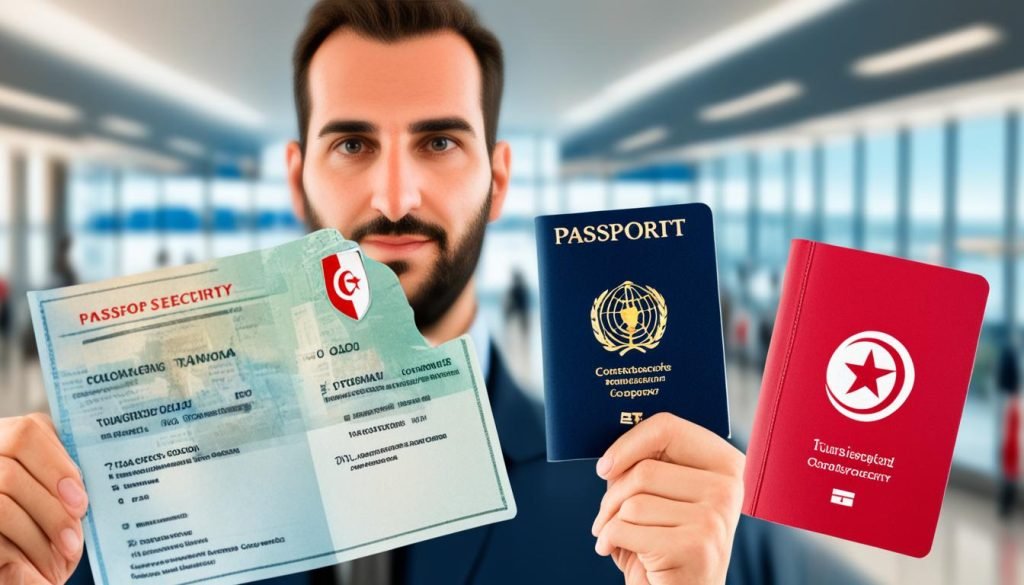
| Aspect | Relevance to Dual Citizens |
|---|---|
| Voting Rights | Available with some restrictions |
| Access to Public Office | Permitted, excluding the presidency |
| Property Ownership | Recognised under Tunisian law |
| Conscription | Varying obligations based on dual nationality |
To wrap up, Tunisia’s acceptance of dual citizenship sees the value in a globalised society. The Tunisia dual nationality policy aids citizens to balance their responsibilities and rights to Tunisia and another country. This ensures their protections and recognitions are maintained.
Benefits and Challenges of Dual Citizenship in Tunisia
Having dual citizenship in Tunisia offers many pros and cons. Knowing these can help you handle the complexity of having two nationalities.
Advantages of Holding Dual Citizenship
Dual citizenship in Tunisia provides several benefits. It lets you travel freely between countries. This makes living, working, and studying abroad easier.
It also allows for greater cultural experiences and better job opportunities. You can vote and use social services in both countries. These benefits greatly enrich your life.
Potential Legal and Practical Challenges
Yet, dual citizenship comes with challenges. One major legal issue is dealing with taxes in both countries. You might also face military service requirements or loyalty issues.
Understanding both countries’ laws is crucial. Diplomatic protection issues can arise if the two countries have conflicts. It’s important to balance your rights and duties in both places.
In short, the perks of dual citizenship in Tunisia are plentiful, but so are the challenges. Fully understanding the laws and rules is vital to enjoy dual nationality without problems.

